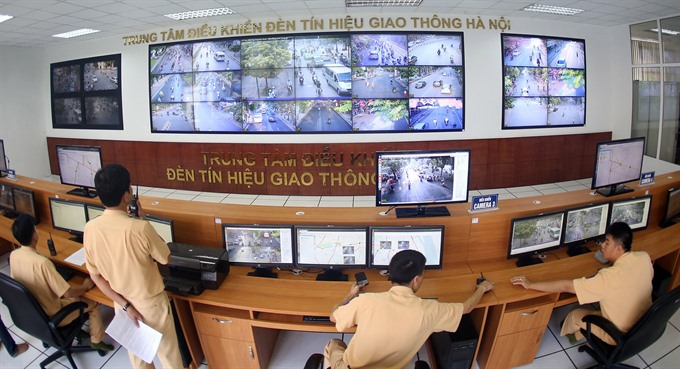 Society
Society

Local Vietnamese tech companies “are fully capable of” providing the core components of a smart city, Lê Ngọc Tuấn, head of the Internet-of-Things (IoT) division in one of the leading IT companies in the country, FPT.
 |
| Police officers in the traffic signal control centre of Hà Nội. In the ’smart city’ future, a system of sensors and actuators would automatically handle the management of traffic signals based on current demands, without the need for human intervention. — VNA/VNS Photo Huy Hùng |
HÀ NỘI — Local Vietnamese tech companies “are fully capable of” providing the core components of a smart city, said Lê Ngọc Tuấn, head of the Internet-of-Things (IoT) division in one of the leading IT companies in the country, FPT.
The vision of modern, urban Việt
Tuấn stressed that with the advent of the fourth industrial revolution, with IoT at its heart, smart solutions will be necessary in the future where automation and Artificial Intelligent reign, freeing humans from repetitive labour and allowing them to focus on more innovation and creative works.
“Most importantly, the ultimate purpose of any smart initiative, including a smart city, is to improve quality of life,” he added.
The notion of the smart city has been an increasingly hot topic in Việt
Still, ‘smart city’ remains a fairly vague concept with no rigid definition. However, most would agree that a smart city would be an urban area that intensively utilises technologies to optimise its operations – everything from simplifying administrative procedures and ensuring effective functions of water and power supply to collecting trash and managing lighting on streets at night.
A 10-component smart city was proposed which would include smart energy, smart mobility, smart community, smart environment, smart education, smart manufacturing, smart aerospace city, smart innovation, smart economy and smart governance where every component would be interlinked in a harmonious manner.
Somhatai Panichewa, CEO of Amata Việt Nam PLC, said that the company would start in Hạ Long City in the coastal province of Quảng Ninh as the destination for a 714ha smart city project, underlining its confidence in the future development of Việt Nam’s north-eastern region.
Prime Minister Nguyễn Xuân Phúc, during a meeting with several Thailand businesses within his State-level visit to Thailand last year, has asked Quảng Ninh authorities to “create favourable conditions” for the company to conduct smart city projects in the province. He also told the company to pay attention to land clearance and environment protection, given the world heritage status of Hạ Long City.
As the investor of two smart cities in the Eastern Economic Corridor (EEC) of
Thailand’s government has delineated a clear strategy of developing smart cities within the EEC, with several investment incentives such as a flat personal income tax rate (17 per cent), reduced corporation income taxes, and extending land use certificates from the previous 30 years to up to 99 years.
“These are some of the key policies that
Vũ Tú Thành, deputy regional managing director and Việt
As State agencies are not easily willing to part way with the budget and resources allocated to their unit to contribute to a mutual effort, making it hard to translate ambition to reality, and as a result, American firms’ involvement in government-led smart city efforts was sputtering, Thành said.
However, he affirmed that the reception in the private sector has been positive, with many corporations and businesses who have a long-term development strategy already investing their resources in finding ways to optimise their operations. — VNS